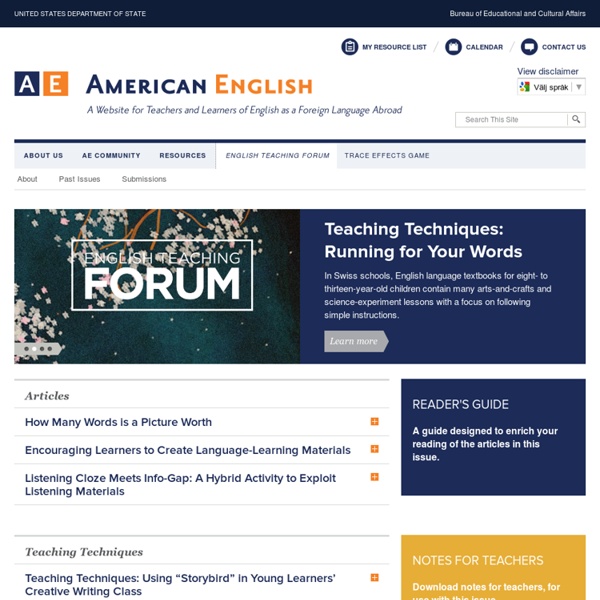



Preparing for the CELTA etc 15 practical suggestions on what you should do prior to taking any CELTA or similar TEFL certificate course 1. Learn a language This can help you put yourself in the shoes of your future students and get some ideas on what ways you like learning and therefore are most likely to choose when teaching. If possible, try studying in a monolingual class (one where English isn’t used), learn to use phonetic symbols in a dictionary (languages where the spelling is irregular like French are good for this), and learn as much grammar terminology as you can. Learning another script like Thai or Russian can also be good experience. 2. 3. 4. 5. 6. 7. 8. 9. 10. 11. 12. 13. 14. 15. Leave a comment...
CELTA Syllabus - Certificate in Teaching English to Speakers of Other Languages :: CHESTER School of English, Madrid :: www.chester.es CELTA Syllabus information - taken from the Cambridge ESOL CELTA Syllabus & Assessment Guidelines Course Aims The course enables candidates to: Candidates who complete the course successfully can begin working in a variety of ESOL teaching contexts around the world. Syllabus Overview This document outlines the syllabus and assessment criteria for CELTA. of prospective candidates and outlines both the subject knowledge and the pedagogic knowledge and skills required for beginner ESOL teachers. The syllabus consists of five specific topic areas: Assessment Overview CELTA is awarded to candidates who have completed the course and who have met the assessment criteria for all written and practical assignments. The overall assessment aims for each topic are that candidates should be able to: Assessment Framework There are two components: Syllabus Topic Details Topic 1 - Learners and teachers, and the teaching and learning context 1.1 Cultural, linguistic and educational backgrounds 1.5 Varieties of English
Free EFL English resources for teachers & students: Linguapress.com - Certification Note: We mainly use the term TEFL on these pages but in most cases the terms TESOL/TESL could equally well be used. Frequently Asked Questions General What does “TEFL certification” mean? What’s the difference between a TEFL certificate and a TESOL certificate? What kinds of jobs can I get if I pass a TEFL certificate course? What TEFL certificate has the best name recognition? Are there any international accreditation bodies for TEFL certificates? How can I compare two (or more) different TEFL certificate courses? How can I tell if a course is really equivalent to a CELTA or not? I’ve heard that TEFL certificates aren’t really valued in the country/school that I want to work in/I won’t get any extra pay for having a TEFL certificate. My future boss says/The visa regulations say that any TEFL certificate will do. What TEFL certificates does the British Council accept? There are wildly differing reports online about the TEFL course that I plan to take. Why are TEFL courses so expensive?
TESOL Certificate or Diploma - Travel Forum Hi Mike, Yes they are different, particularly the course you've provided a link to. If you’re talking about getting work teaching English as a second language overseas then you only need the certificate, and I’d say get as much ‘practical’ experience as you can during your TESOL studies. Regarding the diploma, this is more suited to the management and string-pulling side of things, if that’s what you’re looking for. Louise is right by the way, I totally agree. And… degrees don’t make good teachers. PB, for what it’s worth I have to say I’m not ‘really’ using any of the documented techniques I studied on the 120hr practical TEFL course. NB: - The TESOL Diploma is a further 250 hours of own-time online study (beyond the original certification) with milestone examinations along the way..
ESL Acronyms In the English language teaching / learning world, there many acronyms that are used with teaching or learning English as a foreign or 2nd language. The site is named esl.about.com which stands for English as a 2nd language dot About.com. Officially, ESL is spoken by speakers of other languages that live and work in an English speaking country. EFL, on the other hand, is spoken by speakers of other languages using English in non-native English speaking countries. To be honest, these two acronyms are often used interchangeably. As you can notice here at the site, articles, quizzes, lesson plans and other resources are intended for both English as a 2nd language and English as a foreign language teachers and learners. Acronym Definitions Here are the most important acronyms in the ESL, EFL world: With the midst of so many people who use English to communicate with other non-native English speakers, there are two new acronyms that are gaining in popularity.
English as a Second Language - Alternative Careers One of the teaching skills that is most in demand is the ability to teach English. Teaching English as a second language (ESL) is a valuable tool to have. If you can read these words aloud and understand what they mean, then you have the basic qualifications to teach English as a second language to students in other countries. There is a little more that you will need to do, as you'll see below. The Benefits of Speaking English In earlier centuries, French was considered the “universal language” that people of culture sought to learn. Alliances Abroad ( www.alliancesabroad.com) lists many alternative career opportunities, both abroad and in the United States. One of the advantages of teaching ESL is that you do not have to know the language of the people you are teaching. There are many programs that send ESL teachers abroad. You can choose to send yourself anywhere, to classrooms ranging from a grass-and-mud hut in a rain forest to a fancy private school in a cultured European capital.
Gap year travel, Volunteer abroad, TEFL Courses and more from i-to-i Teflnet Accredited - online TEFL course certificate - CELTA/Trinity Alternative TESOL/TEFL Courses with Teaching Practice